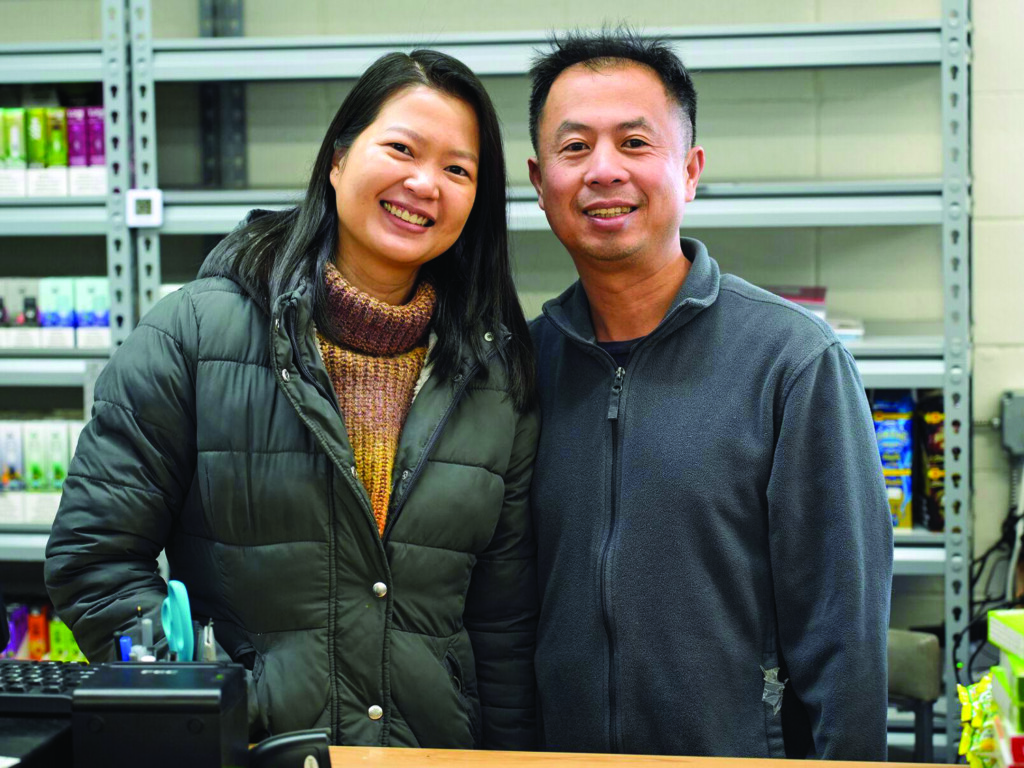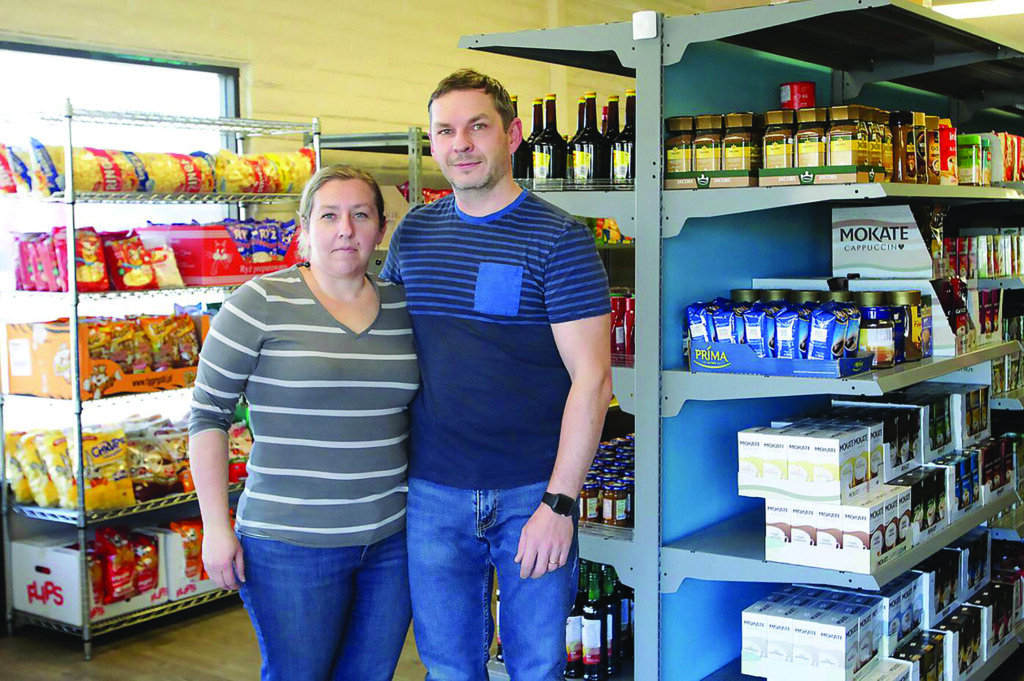When third-generation Japanese-American Carol Leinberger began teaching Japanese and Chinese food cooking classes in 1976, she opened a small grocery store in Grand Junction so her students could access the ingredients she used. Back then you couldn’t find water chestnuts or fresh bean sprouts locally, she recalls.
Interest in sushi-making has increased since then, and so has local demand for raw frozen fish, seaweed and other Asian foods, Leinberger says. She expanded her Carol’s Oriental Foods store in 1980, moving to North Avenue to offer a greater selection of ingredients.
Carol’s is no longer the only Asian grocery in town. Two additional shops opened in just the past year — Asian Market in the Cottonwood Mall and GJ Mart on Belford Avenue.
READ: Plant-based Protein is Taking Root in Colorado’s Food Economy
One in 10 Colorado residents is an immigrant, while another one in 10 residents is a native-born U.S. citizen with at least one immigrant parent, according to the American Immigration Council (AIC). In 2018, 42,844 immigrant business owners accounted for 12 percent of all self-employed Colorado residents and generated $1 billion in business income.
Although an AIC analysis of the 2019 American Community Survey Five-Year Data found the number of immigrant entrepreneurs in restaurants, food retail and other food services did not increase in Colorado from 2014 to 2019, that trend appears to be changing in Grand Junction where several immigrant-owned ethnic food-related businesses have opened in recent years. Data concerning immigrant entrepreneurs in food businesses was not available after 2019.
Meng Truong, a native of Vietnam, and his wife Mey, originally from Cambodia, opened their GJ Mart in February 2023. Both work at the shop, which is open seven days a week, from 8 a.m. to 8 p.m.

Coolers are stocked with fresh produce like bok choy, ong choy, taro root and green papayas. Freezers hold various types of frozen fish, including eel. Fifty-pound bags of jasmine rice are stacked on a pallet near the front of the store.
“It’s a main dish in Asia, typically eaten twice a day, though sometimes substituted with noodles,” Truong says, explaining the stacks of rice. A steady stream of customers, many of Asian descent, were shopping at the store both days a reporter happened to stop in.
Truong, who is fluent in seven languages — English, Mandarin, Cantonese, Vietnamese, Cambodian, French and another Chinese dialect — says he orders what customers want, like the potato and fish corndogs popular in Korea, seaweed salads from Japan, and packages of pancake mix with bean paste.
READ: Why is Colorado Providing Free English Training to Small and Mid-Sized Businesses?
Employees and patients from the nearby Grand Junction Veterans Administration Medical Center often shop at the Asian market. Veterans come for foods they remember from their time serving overseas, and many are married to Filipino women who continue to cook traditional foods, Truong says.
Not far from the Asian market is a grocery specializing in European foods. Polish-American couple Agata and Lukasz Dziwisz opened Euromart in November 2022 on North Avenue. They say they were homesick for foods from their native country of Poland. “The closest European foods store was in Salt Lake City or Denver,” Agata says. “We got tired of driving.”
Euromart carries 10 different varieties of spicy, garlic or smoked sausages. “American sausages are just not the same — they’re made differently,” while his are precooked and “perfect,” Lukasz says. Across from the cooler containing the sausages are shelves of pickled vegetables and sauerkraut — foods Europeans love, he says.

Additionally, Euromart offers various artisan-type breads and pastries from German and Polish bakeries located on Colorado’s Front Range. “European bread is definitely different than in the U.S. — it’s not as spongy,” Lukasz says.
“Chocolate is another huge difference,” he adds, pointing to shelves of chocolate bars from Germany, Switzerland, Belgium, Lithuania and Poland — all of which contain less sugar than most chocolate bars you’ll find in the U.S., says his wife.
Grand Junction residents who emigrated here from Germany, Russia, Scandinavia, Turkey and Poland help comprise a regular customer base at Euromart. European-Americans also travel from Montrose and Moab, Utah to shop at the store, which is open Tuesday through Friday, from 9 a.m. to 4 p.m.
Lukasz had hoped to draw students from the Colorado Mesa University campus across the street but that hasn’t happened, thus far. He says he purposely stocked the store with cold sodas, juices and snacks to attract students, and that the lack of customers from campus has been disappointing. Students who have shopped at the store are typically foreign exchange students, Agata says
Mexican food restaurants and tortilla shops have long been part of the American culinary landscape. In May 2023, Will Blanco and his mother Carlota Blanco opened La Pupusaria, a food truck serving fare typical of El Salvador. Often parked at local brewpubs, La Pupusaria serves pupusas — a thick corn tortilla made from scratch, filled with various combinations of meat, cheese, veggies, beans and jalapeno peppers, folded and sealed, then cooked on a griddle. Another pupusa variety is made with an edible flower, widespread in El Salvador, called loroco which is ground and mixed with cheese.
“For us, it was an opportunity to give people the food we eat on a daily basis,” Will Blanco said. “What makes us unique is we’re the only place you can get pupusas.” La Pupusaria also serves tacos, burritos, smothered burritos, L.A. dogs (a hot dog wrapped with bacon with sautéed onions and peppers), plus, orchata — a traditional rice and milk drink made in-house.
An aunt, two sisters, Will’s wife and two kids, nieces and nephews all help out at times with the food truck. “It’s a true family business; it’s kind of the way we like it,” says Will, a second-generation Salvadoran born in Los Angeles. Their customers include Salvadorans, Guatemalans, Hondurans and Anglo-Americans, he says.
Other immigrant-owned Grand Junction food offerings include nepalese, indian, and thai restaurants.
Sharon Sullivan is a Grand Junction-based freelance writer. She can be reached at [email protected].
